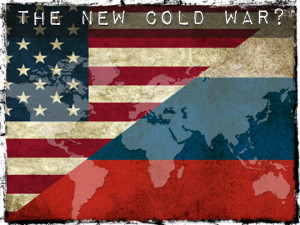
Of course this makes Russia feel equally strong about the American oppressive and interfering egg coming well before the Russian self-defense chicken. It refuses to accept sole blame for all of the bombastic rhetoric. In this particular case reality better supports the Russian side: it is more accurate to describe Putin’s hostility toward America as one far more deeply rooted in frustration. But instead, America characterizes Russia as having an unstable mania that is obsessed with remaining a great Derzhava (powerful state) and will not recognize its culpability in creating its own future political cataclysm.
This perfectly matches what Stephen Cohen astutely called several years back as ‘Cold War Triumphalism.’ In basic terms, since Russia lost the Cold War it was and should be treated as a de facto defeated nation. This triumphalism has arguably never left American decision-making power, given that the advent of this attitude began with President Bill Clinton and has lasted through three presidencies (two Democrat, one Republican), totaling six terms and 24 years. In other words, the American attitudinal perspective toward Russia has witnessed a literal generation passing where the United States has felt justified in selective cooperation, one-way bargaining, uneven playing fields and reluctance on its own part to bury the ghosts of the past because said ghosts give it a decided political advantage.
The failure of America to move past the crowing triumphalism about the end of the Cold War has produced a decided negative impact on Russian-American relations that precludes a new era from developing. It is as if Russia is being criticized that it simply does not know its place or will not accept its role, both of which of course are decided by America and are not open to negotiation. This is why prominent thinkers and players like John McCain, Charles Krauthammer, Ariel Cohen, Hillary Clinton, George Will, Alexander Motyl, and Fiona Hill are quick to damn ‘Russian provocations’ as moving the country to becoming a de facto ‘fascist’ state. In reality no such explicit initiatives can be found backing up such radical accusations. More calm analyses find Russia simply not accepting being told what to do on the world stage and that general position (operating in its own interests for its own interests) is so incredibly basic and elementary for all nations it is perplexing how much kvetching happens in America when Russia does it.
This is especially true when one considers that Russia feels, with some validation, that it has been incredibly non-confrontational with the U.S. on many issues since the end of the Cold War that have not necessarily been aligned with its own national interests. As a result, it is not uncommon to find Russian political players quite adamant that the United States ‘owes’ it for accepting moves that could have easily exploded into formal conflict after the Cold War between the two sides. Americans at times can play too fast and loose with semantics, meaning that as long as the U.S. does not actively try to create political discord in a country like Russia, it thinks it cannot possibly be seen as a source of such discord with controversial communiques about political unrest and civil disobedience. There are simply no Russian actors that would agree with that interpretation and instead see it as a subtle but nonetheless direct attempt to massage and influence the political environment inside the country. Russians to this day point to Georgia, to Ukraine, to the countries of the Arab Spring, to Syria, and believe the build-up to the unrest was either directly orchestrated by the United States or at least subtly fostered by America. To Russians there is no difference while to Americans they are complete polar opposites. And while some of those cases would be an exaggeration to place a large portion of influence on America, it would be naïve to think that open American support and encouragement, at least through formal media declarations and diplomatic speeches, did not have an impact on increasing the intensity and duration of domestic protest. The difference for most Americans is that they see countries like Libya, Syria, Egypt, etc, as needing governmental change. But you have to forgive the Kremlin if it does not agree with automatically being conflated with theocratic Islamic despots by the United States. This is what allows Russia to take statements from Washington about bilateral cooperation and substantive partnership and see nothing but animosity, mistrust, and manipulation.
In a sense, the debate is one of degree: there is no doubt Russia has accepted that the end of the Cold War signaled a decided shift in the balance of power. It did not, however, allow that change to mean that it now had to be permanently relegated to the status of nation-state also-ran. And quite frankly, too many voices in American institutions of power, both governmentally and academically, have taken that premise as an unquestioned reality and as the expected diplomatic path Russia should place itself on. This is why the more strident voices in Russia are so quick to use the word ‘appeasement’ when describing what they think America wants Russia to do and be. As long as the two nations continue to engage each other with this attitudinal chasm, then the relationship will likely continue to be dogged by vast differences of opinion, massively divergent interpretations, and seemingly contradictory positions on nearly every issue. If we do not move beyond Cold War triumphalism and flawed chicken-and-egg dilemmas, then Russia and America will continue to create chaos for each other where there should be cooperation.
Dr. Matthew Crosston is Professor of Political Science and Director of the International Security and Intelligence Studies program at Bellevue University, exclusively for the online magazine “New Eastern Outlook”